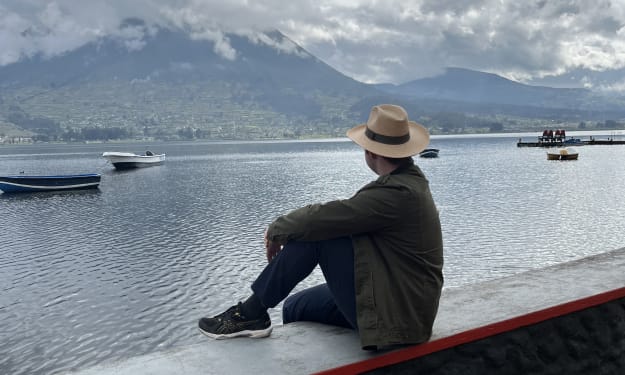Living for Two
Passing Her in the Hallway Changed Everything

“She died. She killed herself.”
My parents said this while holding her obituary.
I barely acknowledged the statement before walking to my room and closing the door.
I fell into a chair and stared out the window, all the thoughts and emotions overwhelming my brain, crushing my heart, fighting in my gut. Something cracked deep in my soul.
I shook my head, placed my forehead against my knees, and sighed heavily. “There’s no escape. I’m going to die.”
A few days later, my family told me about the massive number of attendants who had packed the funeral home. When I angrily asked why they hadn’t told me the funeral was today, their answer was understandable: “You didn’t have much of a reaction to her death; we didn’t think you wanted to go.”
And that was that; two weeks later, I turned 13, and it was months before we talked about her again.
But that was the middle of our story; the first climax was years before.
Two to Four Years Earlier

We had the type of acquaintanceship that kids form when their parents know one another. I’m sure we saw each other as kids, but the first memory I have of her is my third-grade self staring at her while she read her lines from a script, and I worked on math homework a few feet from the stage. I played a role that required five minutes on stage; she was a lead character. I admired her poise and passion, and I knew she was destined for great things.
Months later, I met her abuser.
No one else knew that she was being abused; I figured it out before the adults, and there was nothing I could say or do to prove my wholehearted belief. I had no real evidence.
My evidence was the seemingly innocuous stories that felt just a little off, pieces of data that never seemed to quite add up. And the moment I met him, I felt the confirmation in my gut.
Still in single digits, I could barely communicate emotions, and certainly not instincts. Every time I questioned a hole in a story or something I found strange, my comments sounded petty, argumentative, or–even worse–jealous. Besides, even if I could explain my instincts, I couldn’t tell them why I knew.
Fifteen years later, an acquaintance would call me “articulate,” and it was one of the nicest compliments I received in my 20s.
I certainly wasn’t articulate then; there was simply nothing I could say.
That Moment

I don’t know if her family shared my suspicions with her; I doubt it. Maybe they told her stories that my parents relayed about me, just as they did about her. If they did, maybe she had the same thought, the same suspicion about my life.
A few years after our stage curtain fell, we saw each other again, walking towards one another in a tiny hallway in her father’s office building. I wanted to pull her toward me, to guide her to her father’s office, to stand both of us in front of our families and say, “Listen. Don’t talk. Just listen to what she has to say.” I wanted to be her pillar, to help her finally express herself, but I quickly realized it was impossible; real life isn’t as easy as a fantasy.
Our eyes locked, and I nodded, unable to speak. Surrounded by adults, I held her gaze, hoping that my eyes conveyed everything I couldn’t speak: “I see you; I see your pain. I know your pain. I’m sorry, but they won’t listen to me. It has to be you. You have to tell them. I’m on your side, but you have to tell them.”
She nodded back, and I felt as if she were echoing my own thoughts, as if she actually understood, and something told me she knew we were sharing a terrible experience. In those few seconds, we formed an invisible, unfortunate tether that might, one day, be a lifeline.
We looked into one another’s eyes until we passed each other, and I desperately hoped it was enough.
Perhaps it was. A few weeks later, she shared her truth, and the dominoes began to fall.
But I would never see her again.
Before the End

When I learned that she had escaped from the death grip of that hell, relief flooded my entire body. A court case started. Other people came forward, and there was a modicum of justice.
When I heard she had won the case (although ultimately a Pyrrhic victory at best), I gained even more hope. She’d made it out and been triumphant. What I imagined impossible, she had conjured into reality.
With my own situation rapidly deteriorating, I fantasized that she would be my savior, my guide. I hadn’t seen her in years, but I found myself trying to figure out a way to connect us. We attended different schools, shared no friends, and had zero mutual interests. If my parents asked me why I wanted to see her, what could I possibly say?
I knew that once I told her my situation, and she helped me find a light, we’d have an unbreakable bond that would help us through the nightmares to come. I never thought we would be best friends, but close friends. The kind of friends who don’t care about the day-to-day minutiae, but who share the worst moments and find strength in one another.
I imagined us spending weekends in the park every few months, staring at the river, drinking Mountain Dew, and swapping tips to survive our real-life horror stories. I envisioned calling her late at night when I was drowning in fear, and I pictured myself answering the phone, exhausted but alert, when she did the same.
If she could find the courage, so could I, and she would help me through the rest.
Eight months after her “victory”, my parents said those five odious words: “She died. She killed herself.”
That Night

“There’s no escape. I’m going to die.”
I hadn’t seen her in two years, and that encounter didn’t even include words. I have barely a handful of memories of her. When I tell her story, I don’t say “a friend of mine” because that’s a misnomer; she’s a girl I knew of, a kid I shared experiences with, not someone I actually knew.
But I know our lives, looks, and personalities were eerily similar. I know she was at least as smart as I was, a talented musician, and a good person. I don’t need to know anything else about her to grieve her loss.
Once I started sifting through the emotional wreckage, grief surfaced quickly, not only for her as a real person, but for the imagined woman of the future. The college she’d never attend, the career ladder she’d never climb, the children she’d never raise. All those possibilities just vanished, and I grieved them for her.
The second reaction, however, was purely selfish. “What the hell do I do now?” tumbled in my mind and out my lips. An enormous link was eliminated from my future support system. The tether we formed years ago snapped. There was no one I could talk to about my living nightmare; I didn’t know anyone else who had been through our experience.
There was no way I could do this alone.
All the thoughts associated with that grief and selfishness stayed with me for hours. I saw her on stage reading from her script and her walking towards me in that office hallway. Those scenes looped in my mind until I had the third thought: What if I could have saved her?
Should I have whispered my own story to her in the hallway that day? Should I have confided my own experiences in hopes that she would feel safer, comforted by having an empathetic person in her life? Should I have sent her a message after the court case to offer support? Could that connection have lifted enough of her burden that she would have stayed at least a little longer?
Those were the questions that sunk their teeth into my thoughts the remainder of the night: Could I have saved her then? Who will save me now?
Nine Months Later

Six months after she died, my situation became life-and-death. Less than three months later, I had followed in her footsteps, and my own dominoes were rapidly falling.
“You couldn’t wait 9 months?” I’d ask her on my most desperate days, foreseeing a future tangled in continuous pain.
“I couldn’t save you for 9 more months?” I’d ask on my most guilt-ridden nights, remembering those few seconds in the hallway when I had the opportunity to say something and opted for silence.
Survivor’s guilt is a unique beast; to feel guilty for simply being alive is an immeasurable burden. It’s most common in plane crashes, mass shootings, natural disasters, and other experiences in which one survives an experience that killed many others. However, it happens with plenty of people whose friends commit suicide, too.
Except that she wasn’t my friend; she was a victim in whom I saw myself.
The Next Few Years

My idea of her being my guiding light never felt like a childish fantasy. I believed it in my teenage years, and that belief has persisted into adulthood.
I was a fairly religious teen, and as a person of faith, talking to a dead person (spirit, angel, essence, soul, whatever you want to call her) seemed completely natural.
Her death and my crisis made my beliefs ebb and flow as if I was playing “She loves me, she loves me not” with her and with every life decision.
She loves me. Inviting her on long, winding bike rides. Whispering to her while staring at the glow-in-the-dark ceiling stars. Sitting next to her on the moonlit couch.
She loves me not. Pleading with her while staring at sharp objects. Bleeding from intentional injuries. Engaging in a series of self-destructive behaviors that resulted in police showing me shiny handcuffs.
She loves me. Writing, swimming, creating art.
She loves me not. Fighting, arguing, slamming doors.
She loves me. Thank you for everything you’ve done for me.
She loves me not. I can’t do this without you.
I love her. Admiring her rehearsing her lines.
I love her not. Allowing her to silently pass me in the hallway.
“She died. She killed herself.” Throughout my teenage years, I translated that as “You’re living for two.” I wasn’t any stronger than her nor was my support system any better. I wasn’t smarter than her nor more talented.
It could just as easily have been me beneath a gravestone and her staring at plastic stars. It could have–perhaps should have–been her living for two.
The Following Decade

The hardest years passed, and the guilt scarred into something intrusive, but manageable. On the tenth anniversary of her death, I stared at a barren field for over an hour, thinking of everything I had accomplished, everything I still wanted to accomplish, and all the things she could have done. She probably would have graduated college (I hadn’t yet) and maybe be a wife and expectant mother. Maybe she would have been cramming for the MCAT or playing in a rock band. Nothing felt out of her reach.
The evening temperatures were in the high 30s with only a gentle breeze–the perfect weather to feel as if she were with me, the invisible tether reappearing to connect our worlds for just a little while.
I chuckled, remembering myself procrastinating to watch her fervently animate one of the sister characters.
But as that hallway reconstructed itself in my mind, I leaned my head to stare at the sky. All the what-ifs came flooding back. What if I had whispered that I knew? What if I had hugged her or at least brushed my shoulder against hers? What if I had given into my idea of being her pillar?
What if I had just let that moment linger a little longer?
If I had forced the issue, and she had let me, maybe the dominoes would have fallen sooner, hers by a couple of weeks, mine by a couple of years. Maybe those sodas in the park and late night calls would have been more than a fantasy.
Maybe we could have healed together.
It is quite possible that my (lack of a) reaction in that moment had a greater impact on my life–and perhaps on hers–than any moment since.
And that realization was a boulder plunging into my stomach.
Yes, the guilt was manageable now, but I walked away that night feeling deflated, dejected, and exhausted.
But in the spirit of earlier years, I silently asked her to walk me home.
19 Years After That Night

Fifteen months short of the 20th anniversary of her death, I saw her mother again.
I had traveled hundreds of miles from my adult life to provide a victim impact statement to the parole board regarding my own abuser, who was now up for parole. As I pushed the anxiety into my empty stomach, a desperate plea for it to disregard my nervous system for a few more hours, she came into my thoughts again. Despite being glad that she wasn’t here to participate in this cruel charade, I would have traded anything to rewrite the past and bring her back. If my teenage fantasies could have predicted the future, they would have included her sitting in this uncomfortable chair next to me, and I would have done the same for her.
And as if the universe heard me, her mother entered the room.
She joined my family and informed us that her daughter’s abuser was also up for another chance at parole (after ruining the first). She was making a victim impact statement on behalf of her daughter.
The number of things that had to happen for her and me to be here simultaneously were almost unfathomable.
She and my family reminisced about her daughter, mostly about her final years, and I learned more about her than I had ever known. Those five words were only a shock to me, apparently. Like Thích Quảng Đức, she had given numerous indications that suicide was a real possibility for her, and the adults had tried to help her avoid it.
I stayed silent during those stories, letting them wash over me without judgment or critique.
Someone called the name of my abuser, a request for all attendants to enter the chamber of pleas, and I left everyone in the waiting room to make my statement alone. Four minutes later, I re-emerged, and it was time for us to go.
But I let those few nightmare-inducing minutes fall away, willed my courage to speak, and told her mother about the now, not the then. “I think about her almost every day.”
For the next few minutes, I articulated how much her daughter means to me, the impact she has on my life, and how she helps restore my faith in people when humanity’s cruelty crushes my optimism.
She never knew any of this (and why would she?) and she was deeply touched. Before we left, she hugged me, and I tried to stay in that moment, feeling all the implications of the day.
Staring at the ceiling that night, I said to a silent room, “Your mom hugged me today.” The voice in my head replied, “I know. I saw.”
I smiled for a moment, then shook my head. “It should have been you.”
When I returned to my adult life a few days later, I wrote another impact statement imploring the parole board to make the right decision, except this time it was for her.
That Night, Revisited

“There’s no escape. I’m going to die.”
That panic- and guilt-induced predication didn’t materialize, but the belief that it would be harder without her certainly did. Although I found solace in an imagined or spiritual (depending on your belief system) tether, it was nothing compared to the lifeline that could have existed if our paths–our lives–had aligned.
Even if I could reverse time and revisit my younger self, I wouldn’t have anything to say to them. There were no words that could comfort me in the hours that followed.
And even if I had known when the funeral was, I wouldn’t have gone. It would have felt selfish, disrespectful because I really didn’t know her. I knew her potential, what the future might hold for her, but not who she was then. My demand to make the choice to attend might have been just, but the anger was feigned.
It was simply a smokescreen for the misery and emptiness of the days, weeks, and possibly years to come. It was a 12-year-old kid trying to figure out how to cope with the loss of a person with whom I simultaneously had so much and so little in common.
Her decision to take her life changed me, but perhaps that was a ripple effect of passing her in the hallway so many years ago.
The Present

I no longer think of that day in the hallway. When I remember her, I recall the mesmerizing young actress and the connection I shared with her mother nearly 25 years after curtain call.
I think of what she means to me now: a motivational force when I’m losing hope for the future and a comforting presence when I’m losing faith in humanity.
A reminder that I am living for two, and that what I do, matters.
Someone once asked me, "If the roles were reversed, do you think she'd feel and do the same?" This was said to convince me that I'm putting too much pressure on myself, that she wouldn't have the same reaction if I had died instead.
I neither know nor care because the answer is irrelevant. I would want her to live the life she wanted to live, whatever that is, but in no scenario do I see myself breaking my chains before she broke hers.
I won't pretend to know if it was strength, bravery, luck, or a mix thereof, but whatever the trait, she possessed it and harnessed its power to leave.
She found her voice long before I found mine, and I would like to think, if the roles were reversed, she would have found it in that hallway, too. She would have wrapped her arm around my shoulders, taken me to my family, and said, "Listen. Don't talk. Just listen to what she has to say."
About the Creator
Alex Casey
I'm a full-time educator and part-time writer. My best ideas usually end up on Vocal.
Enjoyed the story? Support the Creator.
Subscribe for free to receive all their stories in your feed. You could also pledge your support or give them a one-off tip, letting them know you appreciate their work.







Comments
Alex Casey is not accepting comments at the moment
Want to show your support? Send them a one-off tip.